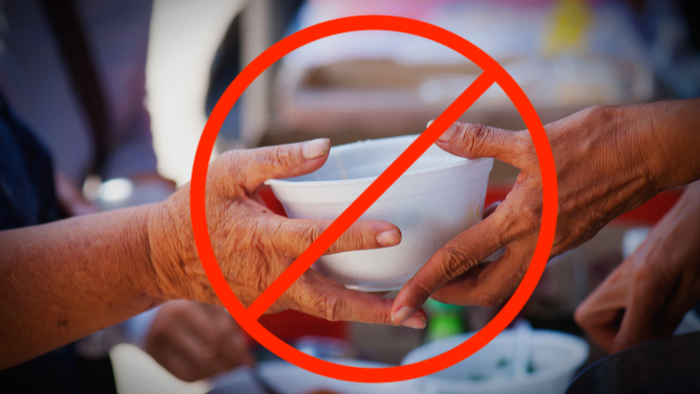It wasn’t that long ago that I lamented the government’s interference in a citizen’s attempt to feed her fellow humans who were struggling due to the COVID lockdowns. In a more recent story, a member of the Charlotte, NC City Council, Tariq Bokhari, suggested the criminalization of food donation to the homeless.
His rationale? The donations should be made to charities that feed the homeless so that, I suppose, there’d be better control.
By the government, it’s safe to say.
Of course, government in NYC chose to reject bagels donated to shelters, because they didn’t conform to their nutritional guidelines, but that’s an angle for another day.
The linked story informs us that Las Vegas, Orlando, Dallas, Houston, New York, Philadelphia, Birmingham, and San Antonio have, at one time or another, banned people from sharing food with the homeless. It also tells us of a 72 year old man in Orange County, CA, who was arrested (and injured during the arrest) for sharing food a couple years ago.
To understand why politicians would write such prohibitions, we must think as politicians do, as in consider everything from an angle of power and control.
Americans of all political stripes have strong empathic and charitable streaks in them. Some manifest it by donating money. Some manifest it by donating time. And some, unfortunately, manifest it by “donating” others’ money and time. When you hear someone of a left-leaning world view say that “we” need to take care of the homeless and provide better health care to the poor, it’s often a safe bet that “we” isn’t the two of you acting voluntarily. Rather, it’s very likely “government” taking from some to give to others (and taking a vig for itself in the process). This is where you hear people speak of the “right” to health care, to food, to shelter, to a ‘dignified’ wage, and so forth. The uncomfortable truth that all these “rights” (called positive rights) require coercive confiscation of the fruit of others’ labor is waved off. In addition, those not of this “abdication of responsibility” (as David Mamet dubbed socialism) bent routinely point out the empathic and charitable streaks I mentioned, and speak of all the good works that private citizens and private charities accomplish (usually at far greater efficiency than the government).
Private altruism is a burr under the statist saddle. Bernie Sanders, when he was still just a mayor, voiced his dislike of private charity because it competed with the government. Bernie’s candor tells us something about at least some of those who support such donation bans.
By monopolizing charity, by restricting or prohibiting private-sector largesse, government can then claim that there’s an obvious shortfall in care for the needy, and thus bootstrap authority to take from taxpayers, under the guise of some pseudo-moralistic “we” must help the poor. Exacerbate a problem, take sole authority for correcting it, and voila, power, control, and OPM.
Of course, there are millions who cheer them on, because it’s far easier to be generous with other people’s money and time than with one’s own. It’s really easy to deceive one’s self into thinking that one is a better person for advocating government largesse or “safety nets” when the cost will be borne by someone else. Politicians, agitators, and other cynical self-servers encourage this false charity, because they know that a critical mass of such voters will put them in a position to take what they want from those they choose to plunder.
Prohibiting private charity in piecemeal fashion mirrors countless other government infringements of our individual liberties. They can’t take them all at once, so they nibble. They get us used to defaulting to their rules, no matter how picayune, counterproductive, or immoral, and then they infringe some more.
There’s always some “reasonable” explanation for each nibble, of course. Just today, I had a discussion with someone on a different matter of liberty, wherein I was proffered the word “compromise.” “Compromise” always means giving the rights-infringer a bit more than he’s already taken, of course. So, if a politician suggests that giving food to the homeless should be criminalized, don’t be surprised that in the ensuing uproar he comes up with a “compromise” position that gets him some of what he wants and takes away a bit of your liberty in the process.


One of the reason I often hear against private Charity is that they are mostly Religious institution.and therefore some people won’t go because of fear of being preached at, or shamed…
my response is that Atheist groups will shame you for decisions based on Religion…
(of course the irony is that Atheist are considered a religion.)
Banning a charity for proselytizing has 1A problems.
And that’s why they want ban all private charities
They are slow boiling the frog. An infringement here, and an infringement there. All for the “greater good”. They know they can’t do it all at once, we are too well armed. So they are doing it gradually.